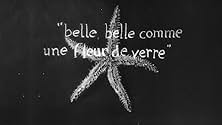L'étoile de mer
- 1928
- 21min
Ajouter une intrigue dans votre langueTwo people stand on a road, out of focus. Seen distorted through a glass, they retire upstairs to a bedroom where she undresses. He says, "Adieu." Images: the beautiful girl, a starfish in a... Tout lireTwo people stand on a road, out of focus. Seen distorted through a glass, they retire upstairs to a bedroom where she undresses. He says, "Adieu." Images: the beautiful girl, a starfish in a jar, city scenes, newspapers, tugboats. More images: starfish, the girl. "How beautiful s... Tout lireTwo people stand on a road, out of focus. Seen distorted through a glass, they retire upstairs to a bedroom where she undresses. He says, "Adieu." Images: the beautiful girl, a starfish in a jar, city scenes, newspapers, tugboats. More images: starfish, the girl. "How beautiful she is." Repeatedly. He advances up the stair, knife in hand, starfish on the step. Three p... Tout lire
- Réalisation
- Scénario
- Casting principal
- Une femme
- (as Alice 'Kiki' Prin)
Avis à la une
A great deal of the sequences are shot through a pane of glass, giving the film a diffuse, dreamy quality, although there are also many stunning shots in sharp focus. The uncanny motif of the starfish is the primary piece of Surrealist iconography, which reoccurs at several junctures, including a beautiful close-up that captures the sea creature's graceful delicacy in locomotion and its multitude of tiny pedicellariae.
Unlike the more striking and barbaric imagery of "Un Chien Andalou", another famous Surrealist short film produced in the same year by Salvador Dali and Luis Buñuel, this film is more lyrical and sensuous, evoking with a sense of innate desire and mystery, the concept of the marvelous outlined by André Breton in the Surrealist Manifesto of 1924.
Kiki of Montparnasse superbly portrays the primeval Surrealist muse and heroine, unashamedly stripping off her clothes in one scene, peering nefariously over the edge of a newspaper in another, and slowly climbing a staircase brandishing a long shimmering dagger in one of the penultimate scenes.
This film was way ahead of its time, anticipating stylistic and thematic currents that weren't fully developed until the latter half of the 20th century such as narrative discontinuity, jump cuts, the femme fatale and the dream sequence. A must see for all cinéastes and lovers of the Surreal.
This one, however, stood out above all the rest. This director clearly had an ability to capture the surreal and dreamlike that David Lynch or Jan Svankmajer would envy. I was simply in awe throughout the 16 minutes this was on screen.
One great aspect, though, about this short film, was the music. Now, the music may not have been part of Ray's original intentions, but it fitted this film perfectly - haunting and hypnotic. Reminded me a lot of some of the incidental music from Tarkovsky's Stalker.
This short definitely gets a 10.
What we see in the first moments is a man and woman walking together, going up to a room, and we can make out a woman disrobing (maybe not all the way, but close to it), and the man leaves her in bed. Then a flow of images come forward - not quick at all, but in the wave that comes with a hallucination under a psychedelic or in that weird wave right before you go to sleep, if not outright dreams: a starfish, close-up, in slow-motion; twelve different shots of starfish and starfishes in glasses (four across, three up); and the woman in bed or the man walking alone.
What does all this mean? Should it matter to decipher it? At the time this film was one of many in the wave of surrealists coming forward - it was either this or another of Ray's films that screened with Bunuel's debut Un chien Andalou in 1929 - and in here, there's nothing THAT scandalous about it for today. It might have been for the period though: just the thought of a woman disrobing, or just showing her legs, as she does, albeit out of focus (and we can see when the camera goes in focus part of her leg and foot) was unthinkable for a prudish, mass collective audience. And if Man Ray was Catholic, as several of the surrealists and dadaists like Dali and Bunuel were, that was part of the point, to provoke himself as much as the audience around him with these startling images. There may also be violence invoked here as well, with a woman stalking up stairs with a knife.
Some inter-titles come up from time to time here, and the most intriguing and poetic come at the start: "Women's teeth are objects so charming... that one ought to see them only in a dream or in the instant of love." Could this be a clue as to what the film is "about" if anything? Or is it all part of the piece itself, leading a viewer through a stream of images and contrasts - think the soft flesh of a woman's skin with the scaly outside of a starfish itself - and about what a woman's presence means in general? Teeth being invoked is also curious and unsettling - why only in love or a dream? Perhaps for Man Ray, teeth are what the eyeball was to Bunuel.
Or, again, as in a dream, everything means something else to that person. Starfish isn't as direct or confrontational as Bunuel & Dali's dreamscapes, but it does what it should by bringing the audience along through images that, at that time and rarely since, no one has seen quite like before. Visualizing such an inner-sanctum as the subconscious is one of those things cinema does well, and Man Ray shows it.
"L'Étoile de merde" ... whoops, "de mer" ... features a lot of blurry photography and a recurring visual theme of a starfish, which is never explained. Starfishes have the fascinating ability to regenerate lost limbs -- and even to regenerate entire duplicate bodies -- but, if that has anything to do with this movie's theme, Ray neglects to say so. I was much more impressed by this movie's title cards, which (in French) manage to include rhymes, a pun ('Si belle, Cybele') and some portmanteaux.
As so often in Ray's work, there is indeed a beautiful young woman seen in this movie. Unfortunately, the photography is (largely) so blurred that we have little opportunity to appreciate her. I'll rate this mess one point out of 10.
It is a typical example of experimental cinema from this era, which also unleashed the likes of Germaine Dulac's THE SEASHELL AND THE CLERGYMAN (1928; the main reason I picked up this Kino DVD collection in the first place!) – with a similar aquatic reference, no less! – and the Luis Buñuel/Salvador Dali collaboration UN CHIEN ANDALOU (1929), both of which also boasted overtones of eroticism and violence. Even so, the most notable effect here is the frequent distortion of the image, as if it was being shot through stained-glass windows!
Le saviez-vous
- ConnexionsFeatured in Un siècle d'écrivains: Robert Desnos (1997)
Meilleurs choix
Détails
- Date de sortie
- Pays d’origine
- Langue
- Aussi connu sous le nom de
- Létoile de mer: poème de Robert Desnos tel que l'a vu Man Ray
- Société de production
- Voir plus de crédits d'entreprise sur IMDbPro
- Durée
- 21min
- Couleur
- Mixage
- Rapport de forme
- 1.33 : 1


